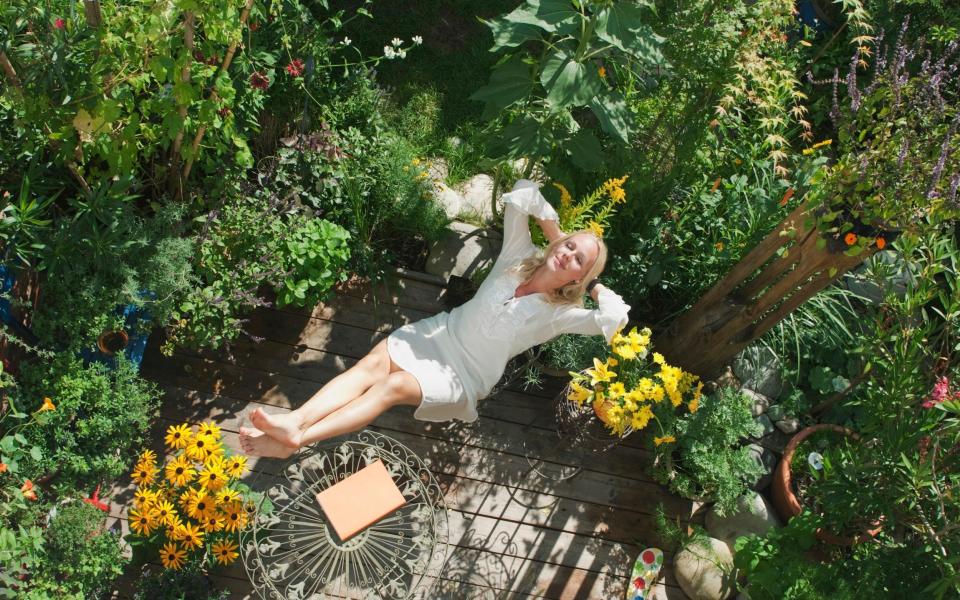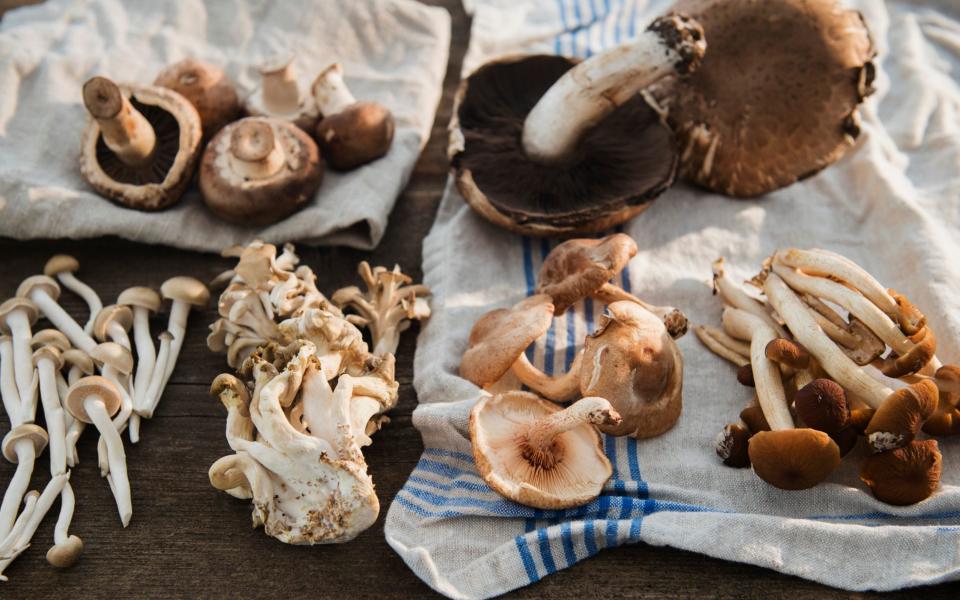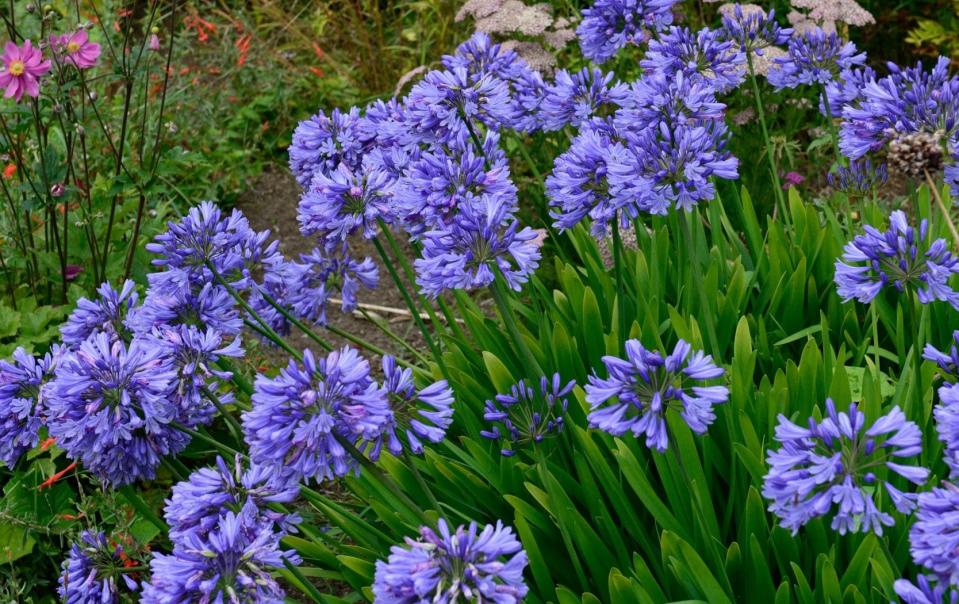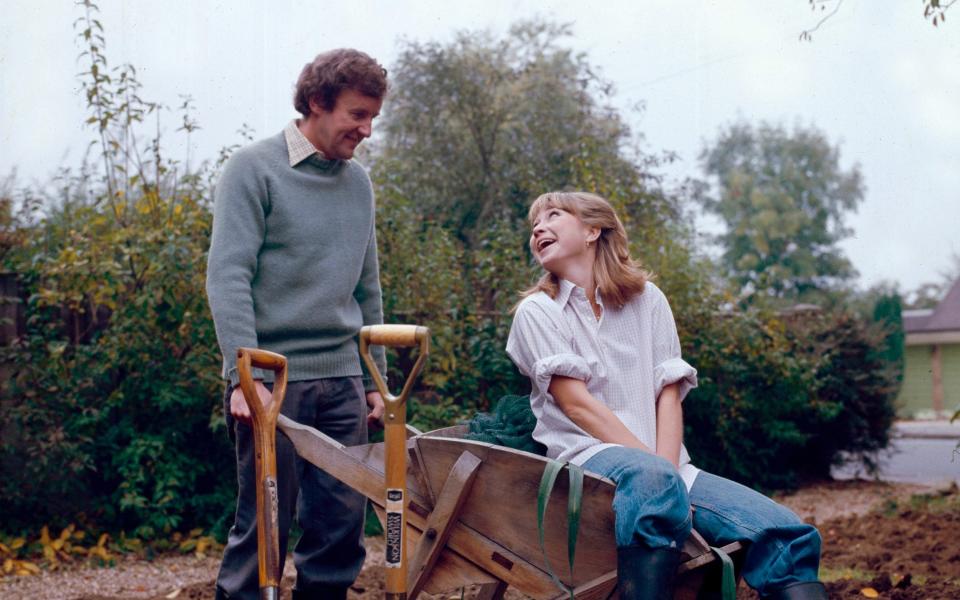What's in and out in the world of gardening this year

From fashion to foliage, our annual original and best garden trends feature showcases what you will be buying (and what's off-trend) in 2023.
Millennials can finally buy peat-free houseplants, and will be mostly wearing dungarees while tending them. We'll pay more for our gardening (like everything else). Dodging drought will be a theme, while quirky ideas that you could be trying include magenta plants, fungi and slate in gardens. Everyone wants to know what's passé and post-pandemic, houseplants and buying online have peaked. Meanwhile, has Monty Don had his day?
In
Farmer chic
Dungarees are many head gardeners’ clothing of choice; TV’s Frances Tophill is an advocate. Carhartt and Dickies are among suppliers of the overalls, a symbol of the back-to-the-land ethic prompted by lockdown-life rethinking. Lucy & Yak, Land Girl and Blaklader are smaller brands.
For the full look, dye your own with homegrown woad. Lucy Greenwood, co-founder of Lucy & Yak, says she’s been selling more dungarees to gardeners because they are “comfortable as well as functional, with plenty of pockets for seeds or gloves”.
Cotton dungarees are good sun cover-ups and protect legs from scratches and stings. Pair with gardening compression socks from Vim & Vigr and complete the look with Crocs – in April 2022 there were 60 per cent more searches for the foam resin shoes month on month, and there was a 64 per cent increase year on year, says comparison site Idealo.
Fungi fever

Mushrooms are a theme for shady places in Kew’s redesigned kitchen garden, says Kew’s kitchen gardener Helena Dove. Chelsea Flower Show will have a mushroom grower exhibiting for the first time: Caley Bros, who are also working on Kew’s mushroom installation.
On February 24, Kew will host a Mushroom Growing Workshop and a visit to the Fungarium where there are 1.25 million dried specimens. Mushrooms are good meat substitutes for the increasing number of people embracing veganism, and vegan farming is also on the rise.
Stock-free organic standards – for cultivation of plants using no livestock manures or animal remains – introduced by the Vegan Society and the Vegan Organic Network will mean more growing suitable for vegan veg boxes.
Inflation
There’s 15 per cent extra on garden products and 10 per cent on plants (according to the Office for National Statistics) in recent months. On the other hand, high prices of fruit and veg caused by high energy prices and lack of overseas workers to pick them mean a grow-your-own boom is likely, say seed and vegetable-plant sellers.
Barclaycard says a quarter of shoppers are switching from branded to budget or own-branded goods to beat inflation, and garden retailers such as Dobbies are using this as a way around big price rises.
Staycation gardening

Boyd Douglas-Davies, director at the garden-centre group British Garden Centres, predicts a return to “cocooning” in the garden, as many people are still working partly from home, and the state of the economy is putting foreign holidays out of reach.
The National Trust has a 2030 net-zero carbon-footprint aim that does not include transport of visitors to venues – but rising fuel costs are “making people think twice” about visiting anyway, which could lead to more leisure time spent in one’s own backyard.
Peat-free planting
There’s likely to be a shortage of peat-free plants available since specialist growers Lowaters and Country Garden Plant Sales have closed down. However, peat-free indoor foliage plants from Creswick Nurseries are finally available at National Trust shops after the charity spent 20 years looking for them without success – UK houseplants are usually grown in Holland, where digging up peat is not seen as an environmental issue to the degree that it is here.
Millennials will now be able to buy their house “pets” without feeling guilty that they are damaging the planet by causing peat bogs to be dug up and carbon to be emitted. The Government plans to ban gardeners from using bagged peat by the end of 2024.
Drought-friendly plants

There will be plenty of replacements needed in UK gardens after temperatures hit 40C last summer. The RHS says acer, fuchsia, heuchera, ferns, anemone, astilbe, phlox, crocosmia and roses struggled (David Austin Roses has dropped some thirsty old-rose varieties). Ericaceous plants withered too – a camellia died in my garden from heat shock. Agapanthus could replace hydrangeas in British gardens, according to Fairweather’s Nursery. Drought-friendly seeds are also in vogue: Franchi Seeds (seedsofitaly.com) has introduced a drought-tolerant veg kit featuring long-rooted Swiss chard, plum tomatoes and ‘Jack and the Beanstalk’ French beans.
Suttons’ heat-loving aubergine ‘Knight’ series are new for 2023, while ‘Bhut Bhindi’ okra is new from Burpee Europe. Gardens Trust chairman Peter Hughes says gardens need to be allowed to adapt to climate change by being permitted to move with the times. He said lots of “hot” areas of gardens featuring plants such as cannas were being developed, an example of which is Levens in Cumbria, which is “adapting to change with hot borders”. Another result of climate change is that gardens open to visitors will have to close more often due to extreme weather.
Battling plastic
Evergreen Garden Care is rolling out a used compost bag collection scheme with resource-management company Veolia at 70 Dobbies garden centres, to prevent plastic going into landfill. FertileFibre is selling a DIY compost-making kit, which includes no plastic at all.
Fortress Britain
RHS Chelsea Flower Show could see fewer big trees this year, with imports being curtailed. Strict controls have been imposed on imports of cedar and pine, for instance, and poinsettia supply has been interrupted, as the UK seeks to exploit Brexit and improve biosecurity. This could lead to more UK-grown plants.
Royal warrant holder Hillier has twigged and bought hundreds of acres of Hampshire countryside to grow trees to sell. The Government wants 30,000 hectares of trees planted per year UK-wide by 2024. In addition, the Queen’s Green Canopy programme has been extended after more than a million saplings were planted, and roses with the name Elizabeth also sold out last year as patriots planted memorials.
Name changing

Ethnobotanist James Wong says ditch the word “gardening”, preferring hashtags such as #plantdaddy, #plantparenthood, #crazyplantlady and #urbanfarmer; and the RHS isn’t keen on “horticulture”, preferring “environment”. Natalie Porter, co-founder of the Young People in Horticulture Association, says we should ditch the name “bedding plants” and use the term “plant me on” for bedding plants, and “show me off” for hanging baskets and planted containers.
Doing good
There’s a new earnestness in garden thinking: landscape designer Darryl Moore says we need to rethink attitudes towards plants beyond aesthetics. He says gardeners have coasted along thinking they are green, but have been woken up by climate change.
Moore’s book Gardening in a Changing World: Plants, People and the Climate Crisis (Pimpernel Press) states: “We all have responsibilities as gardeners in the widest sense of the word, and our actions matter. Working more wisely with plants will prepare us for confronting the challenges of the future. It should be a cause for celebration, not a chore.”
Natural materials
The RHS has announced the online retail launch of the RHS Welsh Slate Collection, a range of garden features made by Welsh Slate Water Features. This is part of a move towards more natural landscaping materials driven by ecological concerns about carbon footprints. Other examples are wool products such as Dalefoot compost, twool tree and shrub tie, and Hortiwool insulation pads; rubber (rather than plastic) pots from Wildlife World.
Plant subscriptions
Curated deliveries of plants and garden stuff are becoming more widespread. They are offered by Mind, Body & Soil, Muddy Trowel and the Rose Press Garden. The Good Housekeeping Institute recommends Appleyard, Bloom & Wild, FlowerBx, Patch and Waitrose.
The hot colour
Colour trends forecaster Pantone has picked Viva Magenta 18-1750 as its colour of the year: “A brave and fearless shade, whose exuberance promotes a joyous and optimistic celebration, writing a new narrative.” Last year’s colour was Very Peri, which attracted a lot of interest from plantspeople. This year, plant Spiraea japonica, Walberton’s Plumtasic or Buddleja ‘Buzz Magenta’ to create your own “Magentaverse”.
Out
Rewilding
A beaver-friendly garden for the charity Rewilding Britain won gold at Chelsea last year, but the naturalistic look is not for everyone. TV favourite Alan Titchmarsh says wild meadows can place unrealistic expectations on amateurs to keep them blooming with wildflowers, as they have a tendency to descend into weed beds and dead zones.
The Tower of London’s Superbloom installation is an example: during the 2022 jubilee celebrations, the wildflower moat meadow was far from blooming. Well-tended gardens and the craft of cultivating plants is now “disparaged” in favour of unkempt plots, says Titchmarsh. The dream middle-class garden makeover that adds five figures to your property does not include bits that don’t look tidy.
Allotment influencers

The 1970s sitcom The Good Life – in which Felicity Kendal and Richard Briers starred as a couple going self-sufficient in suburbia – encouraged a nation to grow its own produce, but it is now nearly 50 years old. Allotments (and gardening in general) are sorely in need of a household name to up their profile. National head gardener Monty Don is well past retirement age, so may be due a replacement: could the BBC go for Arit Anderson or Adam Frost?
Indoor foliage
Figures suggest sales of foliage-heavy houseplants have peaked, but pots of blooms may be in: gardening presenter Michael Perry, aka Mr Plant Geek, tips flowering succulent kalanchoe as an indoor trend for 2023.
Large allotments
According to the National Allotment Society’s guide to building new plots, greenhouses, bonfires and fences are out, for health and safety reasons, while smaller plots are encouraged. Compost heaps are in – some allotment committees make them compulsory – while allotments split into smaller plots are on the rise as demand stays high: some 87 per cent of councils have seen an increase in waiting lists and 64 per cent have reduced plot size where possible
Online shopping
We are not digging online gardening like we were during the lockdown boom. Internet sales saw a 300 per cent rise in 2020, but were down a third last spring as gardeners returned to traditional outlets. In autumn, the £6.5 million start-up online garden market Sproutl went out of business after little more than a year’s trading. Meanwhile, supermarkets – which were able to sell plants during the pandemic – are planning on selling fewer of them in 2023.

